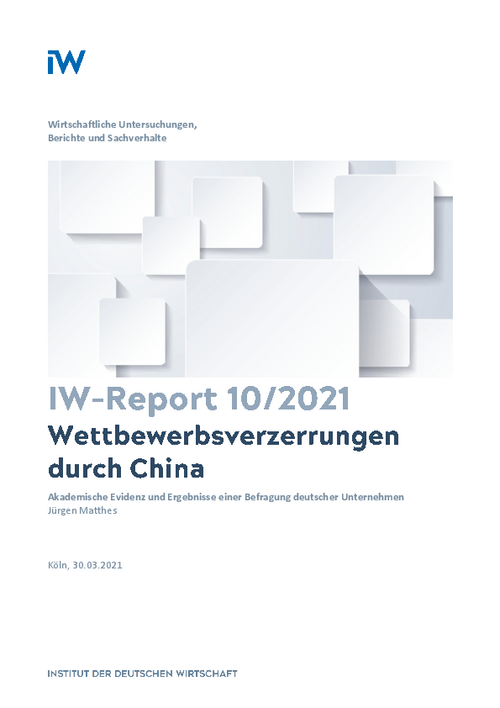The combination of China's size, the increasing competitive pressure from China, its rapid technological catch-up and the competitive distortions of state capitalism could threaten prosperity in Germany. Therefore, it is important to assess the extent of competitive pressure and distortions caused by China's state subsidies.

Competitive Pressure and Market Distortions by China
IW-Report

The combination of China's size, the increasing competitive pressure from China, its rapid technological catch-up and the competitive distortions of state capitalism could threaten prosperity in Germany. Therefore, it is important to assess the extent of competitive pressure and distortions caused by China's state subsidies.
A brief literature review of the available evidence on the Chinese subsidy system shows that China subsidizes state-owned and private enterprises to an extensive and non-transparent degree. OECD case studies for individual sectors strongly suggest that China subsidizes to a significantly greater extent than other countries.
Against this background, German companies were surveyed as part of the IW Zukunftspanel. The results are revealing: Internationalized German companies rate the relevance of competitive pressure from China over the next five years as relatively high. For example, around 42 percent of companies that export to China say that they attach (rather or very) high importance to competitive pressure from Chinese companies. It is also clear that Chinese companies are considered to be efficient and innovative. On this question, for example, 23 percent of the companies with foreign production said "yes" and 31 percent said "rather yes". However and importantly, agreement on the relevance of distortions of competition is much higher. To the question of whether subsidies give Chinese competitors a competitive advantage, 39 percent of the firms with foreign production say "yes" and another 39 percent state "rather yes". It is worth noting that the percentage of agreement for both questions increases with economic proximity to China. For example, around seven out of ten companies that perceive competitive pressure from Chinese companies to be very high answered "yes" to the question about the relevance of state subsidies and around two out of ten answered "rather yes".
The companies were also asked about the importance they attach to a more robust trade and investment policy against Chinese distortions of competition over the next five years. Here, too, there are remarkably high approval rates among industrial firms and internationalized companies. For example, of the companies surveyed with a high export share, around 23 percent consider a more robust approach to China to be very important and a further 39 percent somewhat important. It is noteworthy that the approval rates are also similarly high or even somewhat higher among companies with exports to or production in China, although these companies presumably have to fear countermeasures by China. Among firms that experience very high competitive pressure from Chinese companies, even more than two out of three strongly support ("very important") a more robust policy stance. They are apparently convinced that this is necessary to counteract the distortions of competition caused by Chinese state subsidies, which these companies very clearly perceive.
The response behaviour of German companies can thus be interpreted as an urgent appeal to European and German economic policy makers to take measures to ensure fair competitive conditions ("level playing field"). Recommendations in this regard can be found in Matthes (2020a, b and c).

Jürgen Matthes: Wettbewerbsverzerrungen durch China – Akademische Evidenz und Ergebnisse einer Befragung deutscher Unternehmen
IW-Report

More on the topic
![[Translate to English:] Das Gebäude des Weißen Hauses in Washington, D.C. in den Vereinigten Staaten von Amerika. [Translate to English:] Das Gebäude des Weißen Hauses in Washington, D.C. in den Vereinigten Staaten von Amerika.](/fileadmin/_processed_/c/1/csm_GettyImages-2161499385_White_House_Editorial_884306add8.jpg)
Trump or Harris or ...? What Europe must prepare for
A few months before the presidential election in the USA, Donald Trump has a good chance of being re-elected. On the Democratic side, the incumbent president has withdrawn his candidacy after a long period of hesitation, while Vice President Kamala Harris is ...
IW
Competitive pressure from China for German companies
A firm survey conducted in March/April 2024 as part of the IW-Zukunftspanel among around 900 German companies from the manufacturing and industrial services sectors shows that around 350 of the companies surveyed have Chinese competitors in their markets.
IW